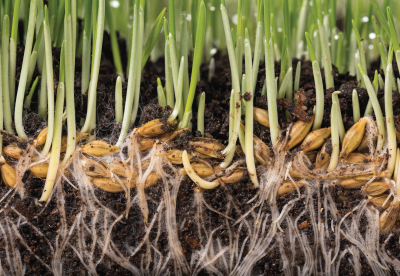Feeding Soil vs. Fertilizing Plants
In the past, growers have traditionally turned to NPK fertilizers (nitrogen, phosphorus, potassium) in an attempt to boost plant growth and yield. Thankfully, regenerative growing practices are making a comeback as we all are learning more about the importance of building long-term health into our soil, not just "quick fix" nutrient dumps on our crops. While fertilizers may temporarily give the appearance of healthier plants, they actually can be extremely disruptive to the nutrient balance in your soil, cause nutrient pollution downstream, and waste a lot of your money. Digging deeper into what nutrients your plants need and why will help you look past NPK so you can build a soil ecosystem that supports more resilient and nutrient dense crops.
Essential Minerals/Nutrients For Plants
According to the National Institute of Health, plants need at least 14 minerals that they generally get from the soil. These minerals are broken down into 2 groups: macro-minerals and micro-minerals. Now, don’t let the prefixes trick you into thinking 1 group is more important than the other. Macro-minerals are simply required in larger amounts, while micro-minerals are just as critical, but only needed in smaller amounts.

Macro-nutrients
- Nitrogen: A major component of chlorophyll the plant uses to photosynthesize its own food. It is also a major amino acid component for the building of proteins.
- Phosphorus: An important part of ATP (Adeno triphosphate) which is the energy unit of the biological processes within a plant’s cells.
- Potassium: Helps with the movement of water/carbohydrates/other nutrients throughout the plant tissue. Activates enzymes in the plant that control protein, starch, and ATP production.
- Calcium: Strengthens plant cell wall support and acts as a secondary messenger when a plant becomes physically or biochemically stressed.
- Magnesium: Powers photosynthesis within the chlorophyll molecule.
- Sulphur: Needed to help plants produce chlorophyll and metabolize nitrogen.
Micro-nutrients (Still essential, just needed in trace amounts)
- Chlorine: Helps the plant make adjustments to osmosis as water availability changes. Also supports the transportation of macronutrients (calcium, magnesium, and potassium) within the plant.
- Boron: Aids calcium in building cell walls and creating new plant cells. Also helps with reproductive growth like fruit/seed development and pollination.
- Iron: Helps chlorophyll production.
- Manganese: Regulates plant growth, metabolism, and sustains the oxygen-evolving complex (OEC) which helps the plant break down and use water.
- Copper: Aids photosynthesis, plant metabolism, and respiration. Also activates enzymes to produce lignin.
- Zinc: Helps chlorophyll and carbohydrate production, increases cold hardiness, forms auxins (which help stems elongate and regulate growth).
- Nickel: Enzyme component that helps metabolize urea nitrogen into usable ammonia.
- Molybdenum: Important component for enzymes that help synthesize amino acids and process nitrogen.
Beneficial Minerals/Nutrients
In addition, there are also some beneficial minerals that can enhance a plant’s hardiness, increase nutrient density, and further increase growth.
- Sodium: In trace quantities, aids plant metabolism and chlorophyll production.
- Selenium: An antioxidant that helps plants cope with stress and enhances other antioxidant enzymes.
- Cobalt: In trace quantities, forms a number of enzymes and increases drought tolerance in seeds.
- Silicon: In certain plants, it improves drought tolerance, delays wilting during water scarcity, and can enhance a plant’s ability to resist toxins.
- Aluminum: Promotes nutrient uptake and stimulates root growth.
Unlocking the Nitrogen Cycle
Nutrients themselves are not enough; no matter how much organic material you have in your soil, if the biology of your soil is sluggish or dead, your plants will not be able to access what they need...(its like laying out a whole, unprocessed steer on a buffet and inviting your guests to eat up). A healthy soil ecosystem has animals, fungi, protozoa, and bacteria to break down nutrients into forms that your plants can use. Supporting the life in your soil helps you naturally tap into the nitrogen cycle without wasting money on unnecessary fertilizers.
Why Soil Testing is Important
Both natural and manmade forces are continuously leaching these minerals away from your soil. Some of these minerals may already be in your soil, but not necessarily in the quantities your plants need. To eliminate guesswork, it is helpful to get your soil tested before adding amendments or supplements to your soil. Redmond Soil Test Kit offers fast and accurate results to help you know before you grow!
Essential Plant Nutrition From Redmond Minerals
Redmond agriculture was started by farmers in the 1950s and is proud to have helped farms across the country boost their plant health and productivity. Our uniquely balanced Mineralyte Soil Amendments are harvested directly from an ancient mineral sea bed and volcanic deposit, deep in the heart of farm country in central Utah.

Adopting a well-rounded and complete soil mineral program will produce both immediate and long lasting rewards for any grower. Click to learn more about how Redmond minerals soil program has helped farms and gardens across the country increase their yields and produce nutrient dense plants that benefit us all. Give us a call at  today!
today!
© 2024 Redmond Minerals Inc.

